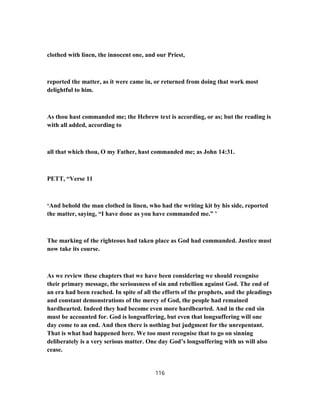The document discusses a vision from Ezekiel in which God summons angels to execute judgment on Jerusalem due to its abominations, indicating a shift from protection to destruction. Six angels armed with destruction tools are depicted, alongside one angel clothed in linen, who serves the role of a mediator to secure the pious remnant who mourn for the city's sins. The vision underscores the theme of divine justice and mercy, highlighting the consequences of sin while assuring the faithful of God's protection.




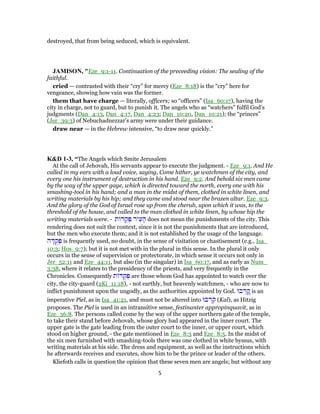

![round in order to address the seven from the throne, since, according to Eze_8:4 and
Eze_8:16, He had gone from the north gate of the outer court into the inner court, and
His servants had followed Him” (Hitzig); for the cherubim moved in all four directions,
and therefore God, even from the throne, could turn without difficulty to every side. God
left His throne, that He might issue His command for the judgment upon Israel from the
threshold of the temple, and show Himself to be the judge who would forsake the throne
which He had assumed in Israel. This command He issues from the temple court,
because the temple was the place whence God attested Himself to His people, both by
mercy and judgment.
CALVIN, “Now the manner of that vengeance which was lately mentioned is
expressed. Hence the Prophet says, God exclaimed, so that his command reached to
the Chaldeans, who were to be executors of his vengeance, and therefore the
imperative mood pleases me better, approach ye therefore. Those who consider the
tense past say “visitations,” nor can they do otherwise, because no sense can be
elicited from the words — to have approached the prefecture of the city. But if we
read the imperative mood, the sense agrees very well, approach ye the prefecture:
the thing is put for the persons, or the name of the men may be understood, and
thus ,פקדות phekdoth, may be taken in the genitive case. As to the general meaning,
God commands his servants who held authority over the devoted city, to approach,
or apply themselves, or be ready to fulfill his work, and let each, says he, have his
instrument of destruction: here destruction is taken actively. For God does not mean
that the Chaldeans were armed for their own destruction, but for that of the Jews,
and the ruin of the city. It follows —
COFFMAN, “Verse 1
THE WICKED ISRAELITES SLAIN; THE FAITHFUL SPARED
This chapter continues the great theme of these four chapters by recording the first
stage of the removal of God's presence (Ezekiel 9:3). Keil's divisions of the chapter
are: (1) the supernatural executioners of Jerusalem are summoned (Ezekiel 9:1-3;
(2) mercy is extended to the faithful (Ezekiel 9:4-7); and (3) Ezekiel's intercession
cannot avail (Ezekiel 9:8-11).[1]
7](https://image.slidesharecdn.com/ezekiel9commentary-161230143555/85/Ezekiel-9-commentary-7-320.jpg)
![THE EXECUTIONERS SUMMONED
Ezekiel 9:1-3
"Then he cried in mine ears with a loud voice, saying, Cause ye them that have
charge over the city to draw near, every man with his destroying weapon in his
hand. And, behold, six men came by way of the upper gate, which lieth toward the
north, every man with his slaughter weapon in his hand; and one man in the midst
of them, clothed in linen, with a writer's inkhorn by his side. And they went in and
stood beside the brazen altar. And the glory of the God of Israel was gone up from
the cherub, whereupon it was, to the threshold of the house: and he called to the
man clothed in linen, who had the writer's inkhorn by his side."
"This chapter is closely connected with the preceding, and carries expressly the
threatening of Ezekiel 8:18 into immediate action."[2]
"Cause ye them that have charge over the city ..." (Ezekiel 9:1). These words need to
carry a more ominous import; and Cooke translated this sentence, "Approach, ye
executioners of the city."[3]
"Six men ... and one man ..." (Ezekiel 9:2). It is ridiculous for men to suppose that
there is any reference here to the pagan gods of the seven planets, or to the so-called
Seven Arch-angels (there being only one archangel). "Seven is a perfect number,
associated in Hebrew thought with 'completeness.'"[4] Clearly, the six men were
supernatural beings, probably angels; because, in the New Testament, angels are
always represented as aiding Christ in the execution of judgment. Also, the
appearance of the seventh `man' with an inkhorn, his evident superiority over the
six, and his having charge of marking the faithful, all suggest his identity as the pre-
incarnated Christ. Feinberg noted that, "From his clothing and the nature of his
work, it is to be inferred that the Chief of these six angels was the Angel of the
Lord."[5] Keil disputed this, but he offered no better explanation. Furthermore,
Keil admitted the superior rank of the seventh man; and that fact alone identifies
8](https://image.slidesharecdn.com/ezekiel9commentary-161230143555/85/Ezekiel-9-commentary-8-320.jpg)
![him as a member of the godhead, there being no one else, as far as we know, who is
any higher than the angels.
"These seven are an overwhelming embodiment of the Divine will, in the face of
which humanity is helpless."[6]
No details of the actual destruction of Jerusalem are included here. None are
needed. God decreed it, and it happened! Just exactly how it happened doesn't
really matter.
The supernatural nature of these six made them more powerful and formidable
than all of the greatest armies on earth combined into a single force.
"And stood beside the brazen altar ..." (Ezekiel 9:2). "This was the Solomonic altar
(1 Kings 8:64), which Ahab had removed and placed north of his new-style
Damascus altar (2 Kings 16:14)."[7] Significantly, these heavenly beings, by their
actions, snubbed Ahab's copy of the pagan altar by choosing to stand by the true
altar.
"And the glory of the God of Israel was gone up from the cherub, whereupon it was,
to the threshold of the house ..." (Ezekiel 9:3) The departure of the glory of the Lord
from Israel is part of the theme of these four chapters; and, "Ezekiel traces it in
stages, this being the first."[8] The normal place for God's glory in the temple was
above the mercy seat in the Holy of Holies; and in this first stage of the glory's
leaving, it removed from the Holy of Holies and went to the entrance of the temple.
COKE, “Verse 1-2
Ezekiel 9:1-2. Cause them that have charge, &c.— Those who are the avengers of
the city: the Chaldeans, whom God had appointed to besiege and destroy this city.
Some understand it of the angels, who have the charge of executing God's
9](https://image.slidesharecdn.com/ezekiel9commentary-161230143555/85/Ezekiel-9-commentary-9-320.jpg)
![judgments; and if so, instead of man and men, we should read person and persons.
One of these was in the habit of a scribe, and employed in the work of mercy; unlike
the rest, who were warriors and destroyers. They stood by the brazen altar; to
denote that the men ordained to destruction were offered up as so many sacrifices.
See chap. Ezekiel 39:17.
ELLICOTT, “ (1) He cried also . . . with a loud voice.—The pronoun refers to the
same Being as throughout the previous chapter. His nature is sufficiently shown by
the prophet’s address to Him in Ezekiel 9:8 : “Ah, Lord God!” The “loud voice” was
to give emphasis to what is said; it is the natural expression of the fierceness of the
Divine indignation and wrath.
Them that have charge over the city.—Not earthly officers, but those to whom God
has especially entrusted the execution of His will concerning Jerusalem. The word
is, no doubt, used often enough of human officers, but such sense is necessarily
excluded here by the whole circumstances of the vision. Nor does the phrase “every
man” at all indicate that they were human beings, the same expression being
constantly used of angels (as in Genesis 18:1-2; Joshua 5:13; Judges 13:11; Daniel
8:16, &c), and the representation here being plainly that of angelic executioners of
God’s wrath. They appear only in the light of the administrators of vengeance, the
description of them being that each had “his destroying weapon in his hand.” This is
repeated in the following verse.
TRAPP, “Ezekiel 9:1 He cried also in mine ears with a loud voice, saying, Cause
them that have charge over the city to draw near, even every man [with] his
destroying weapon in his hand.
Ver. 1. He cried also.] God, to whom vengeance belongeth, calleth aloud and with a
courage, as we say, to the executioners of his wrath, to come and fall on.
Cause them that have charge over the city.] Proefecti urbis - i.e., the angels, here
called the visitations or visitors of Jerusalem, the prefects of the city.
10](https://image.slidesharecdn.com/ezekiel9commentary-161230143555/85/Ezekiel-9-commentary-10-320.jpg)
![Every man with his destroying weapon.] Called [Ezekiel 9:2] a maul, or battle axe,
telum dissipatorium.
POOLE, “Verse 1
EZEKIEL CHAPTER 9
The prophet in the vision seeth a mark set upon some, Ezekiel 9:1-4, and the
destruction of all the rest, Ezekiel 9:5-7. God rejecteth his intercession, Ezekiel
9:8-11.
He cried; the man whom he had seen upon the throne, Christ, who is Lord and
Sovereign. Or, the glory of God, or the God of glory, or an angel by order from God.
In mine ears; either a Hebraism, he cried so that I distinctly heard; or rather to
intimate that Ezekiel only heard what was spoken; the elders who were now with
him hearing nothing of what was spoken.
Cause them to draw near; Approach, ye visitations, i.e. ye sore, wasting,
unparalleled judgments; so the concrete in the superlative degree is sometimes
expressed in the abstract, as it is here: or, these judgments are already near at hand.
It may point, at the chief commanders in the Babylonish army,
them that have charge; not those that were now officers under Zedekiah, and
commissioned by him, but those whom God hath appointed to destroy the city;
angels, say some; the Chaldean commanders, think others.
With his destroying weapon; each of these had a weapon proper for that kind of
11](https://image.slidesharecdn.com/ezekiel9commentary-161230143555/85/Ezekiel-9-commentary-11-320.jpg)










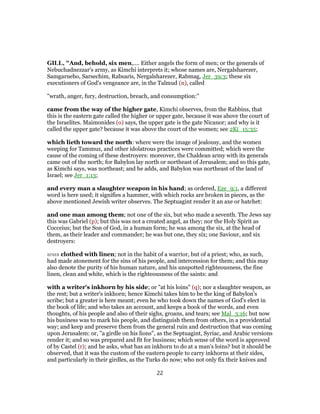
![poniards in them, as Dr. Shaw (s) relates; but the "hojias", that is, the writers and
secretaries, hang their inkhorns in them; and by whom it is observed, that that part of
these inkhorns which passes between the girdle and the tunic, and holds their pens, is
long and flat; but the vessel for the ink, which rests upon the girdle, is square, with a lid
to clasp over it:
and they went in; to the temple, all seven:
and stood beside the brasen altar; the altar of burnt offering, so called to
distinguish it from the altar of incense, which was of gold; here they stood not to offer
sacrifice, but waiting for their orders, to take vengeance for the sins committed in the
temple, and at this altar; near to which stood the image of jealousy, Eze_8:5.
JAMISON, "clothed with linen — (Dan_10:5; Dan_12:6, Dan_12:7). His clothing
marked his office as distinct from that of the six officers of vengeance; “linen”
characterized the high priest (Lev_16:4); emblematic of purity. The same garment is
assigned to the angel of the Lord (for whom Michael is but another name) by the
contemporary prophet Daniel (Dan_10:5; Dan_12:6, Dan_12:7). Therefore the
intercessory High Priest in heaven must be meant (Zec_1:12). The six with Him are His
subordinates; therefore He is said to be “among them,” literally, “in the midst of them,”
as their recognized Lord (Heb_1:6). He appears as a “man,” implying His incarnation;
as “one” (compare 1Ti_2:5). Salvation is peculiarly assigned to Him, and so He bears the
“inkhorn” in order to “mark” His elect (Eze_9:4; compare Exo_12:7; Rev_7:3; Rev_9:4;
Rev_13:16, Rev_13:17; Rev_20:4), and to write their names in His book of life (Rev_
13:8). As Oriental scribes suspend their inkhorn at their side in the present day, and as a
“scribe of the host is found in Assyrian inscriptions accompanying the host” to number
the heads of the slain, so He stands ready for the work before Him. “The higher gate”
was probably where now the gate of Damascus is. The six with Him make up the sacred
and perfect number, seven (Zec_3:9; Rev_5:6). The executors of judgment on the
wicked, in Scripture teaching, are good, not bad, angels; the bad have permitted to them
the trial of the pious (Job_1:12; 2Co_12:7). The judgment is executed by Him (Eze_10:2,
Eze_10:7; Joh_5:22, Joh_5:27) through the six (Mat_13:41; Mat_25:31); so beautifully
does the Old Testament harmonize with the New Testament. The seven come “from the
way of the north”; for it was there the idolatries were seen, and from the same quarter
must proceed the judgment (Babylon lying northeast of Judea). So Mat_24:28.
stood — the attitude of waiting reverently for Jehovah’s commands.
brazen altar — the altar of burnt offerings, not the altar of incense, which was of
gold. They “stood” there to imply reverent obedience; for there God gave His answers to
prayer [Calvin]; also as being about to slay victims to God’s justice, they stand where
sacrifices are usually slain [Grotius], (Eze_39:17; Isa_34:6; Jer_12:3; Jer_46:10).
CALVIN, “Now the Prophet writes that God’s command was not vain or empty,
because the effect appears directly by vision. Therefore six men offered themselves.
Why again he names six, rather than more or fewer, I have not found out. For some
cite the thirty-ninth chapter of Jeremiah, where eight leaders are referred to who
23](https://image.slidesharecdn.com/ezekiel9commentary-161230143555/85/Ezekiel-9-commentary-23-320.jpg)


![characteristic of the human spirit, that would be recognized instantly by
supernatural beings. We do not believe that either in this vision or in the current
dispensation can it be shown that God brands his people with any kind of a literal
mark, such as a rancher would use to brand his cattle.
As Cook noted, "There are eschatological predictions in this chapter."[9] And one
of the clearest of these is that the Great Judgment of the last day will be individually
and not by races, nations, or groups of any kind. Note too that there are only two
classes, the saved and the lost. Another startling fact is that absolutely none shall be
spared except those who have received the mark of redemption. This was the way it
was in the days of the flood; and that is the way it will be in the final judgment.
"That sigh and cry over all the abominations ..." (Ezekiel 9:4). The truly righteous
are always those who grieve over the sins and wickedness of their contemporaries.
We are not impressed at all with some who try to find some reference to the Cross,
or the "sign of the Cross" in this passage. This notion is based upon the fact that the
word here translated "mark" is in Hebrew the name of tau, the last letter of the
Hebrew alphabet; and it is claimed that the early way of making that letter was with
a cross; but as Plumptre noted, "There could have been no anticipation of Christian
symbols, either in the mind of Ezekiel, or in the minds of his hearers."[10]
"And begin at my sanctuary ..." (Ezekiel 9:6). The very place where one should have
been able to find a few faithful believers in God was the holy temple; but here God
commanded that the slaughter should begin there. There is indeed a great
responsibility upon those persons who know God's word and are responsible for
teaching others. An apostle indicated that this principle shall be operative in all of
the judgments of God. "For the time is come for judgment to begin at the house of
God: and if it begin first at us, what shall be the end of them that obey not the
gospel of God?" (1 Peter 4:17).
"They began at the old men that were before the house ..." (Ezekiel 9:6) Dummelow
identified these as "the sun worshipping priests."[11] "Apparently the directive to
26](https://image.slidesharecdn.com/ezekiel9commentary-161230143555/85/Ezekiel-9-commentary-26-320.jpg)
![begin at the sanctuary was intended to imply that there was the seat of the worst
sins."[12] This should certainly be a warning to religious leaders of all generations.
"And he said unto them, Defile the house ..." (Ezekiel 9:7). This was accomplished
by their filling the courts with dead bodies. "If to touch a corpse and then to
worship without being sprinkled with the water of separation was to defile the
tabernacle of the Lord (Numbers 19:13), how much more would the blood of corpses
do so."[13]
Speaking of the defilement of the temple, Eichrodt noted that, "Such a stupendous
act of judgment left no room for any doubt that the complete liquidation of the
inhabitants of Jerusalem would be carried out in full."[14]
ELLICOTT, “(2) One man among them was clothed with linen.—He was among
them, but not of them. There were six with weapons, and this one without a weapon
formed the seventh, thus making up the mystical number so often used in Scripture.
He was “clothed in linen,” the ordinary priestly garment, and the special garment of
the high priest at the ceremonies on the great Day of Atonement (Leviticus 16); yet
also used by others, and on other occasions, simply as a garment of purity and of
distinction (comp. Daniel 10:5), so that there is no need here to suppose a priestly
character attached to this one. He carried in his girdle the “inkhorn,” i.e., the little
case, containing pens, knife, and ink, commonly worn by the Oriental scribe. There
is no occasion to understand this person either, on the one hand, as a representation
of the Babylonian god Nebo, “the scribe of heaven,” nor, on the other, as is done by
many commentators, of our Lord. There is nothing mentioned which can give him
any special identification. He is simply a necessity of the vision, an angelic
messenger, to mark out those whose faithfulness to God amid the surrounding evil
exempts them from the common doom (comp. Revelation 7:3). This party are seen
coming “from the way of the higher gate.” The courts of the Temple were built in
stages, the innermost the highest. This, then, was the gate of the inner court, and
was on the north, both as the place where the prophet had been shown the
idolatries, and as the quarter from which the Chaldæan destruction was poured out
upon the nation. They took their station “beside the brazen altar,” as the central
point at once of the true worship of Israel and of the present profanation of that
worship.
27](https://image.slidesharecdn.com/ezekiel9commentary-161230143555/85/Ezekiel-9-commentary-27-320.jpg)
![TRAPP, “Ezekiel 9:2 And, behold, six men came from the way of the higher gate,
which lieth toward the north, and every man a slaughter weapon in his hand; and
one man among them [was] clothed with linen, with a writer’s inkhorn by his side:
and they went in, and stood beside the brasen altar.
Ver. 2. And, behold, six men came.] Ad hunc Dei clamorem vel clangorem; the
angels came, the Chaldees came, at the call of this Lord of hosts, who hath all
creatures at his beck and check.
By the way of the higher gate.] Called also the new gate, [Jeremiah 26:10] built by
Jotham. [2 Chronicles 27:3]
Toward the north.] Where stood the idol of jealousy, and whereby Nebuchadnezzar
entered.
“ Per quod quis peccat, per idem punitur et ipse. ”
One man among them.] This was a created angel, say some; [Ezekiel 10:2] Christ,
the angel of the covenant, say others, with more likelihood of truth.
Clothed with linen.] As high priest of his people, and in addition an offering for
them, and that without spot. [Hebrews 9:14]
And a writer’s inkhorn by his side.] An ensign of his prophetic office, say some, as
his linen clothing was of his priestly; and of his kingly, that he was among, or in the
midst of, the six slaughtermen, as their captain and commander.
They went in and stood beside the brazen altar.] Where they might receive further
28](https://image.slidesharecdn.com/ezekiel9commentary-161230143555/85/Ezekiel-9-commentary-28-320.jpg)

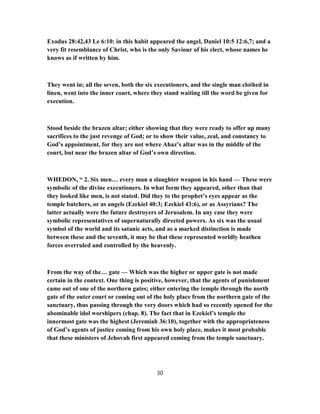
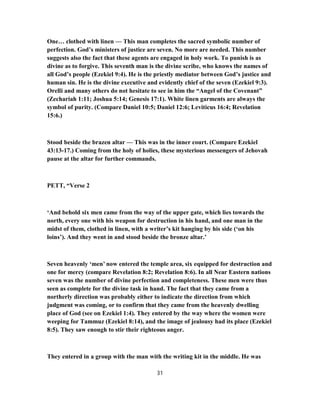


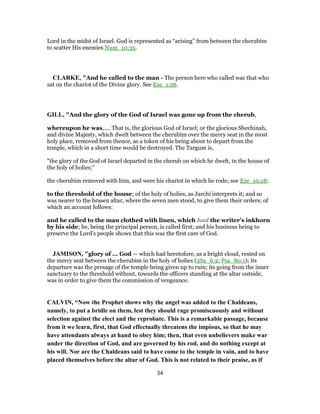


![judgment proceeds from the very Temple itself to which the Pharisaic Jews looked
as the pledge of their safety; while the other would mean that the Lord had already
begun to forsake His Temple. Both thoughts are true, and both are emphasised in
the course of the vision.
TRAPP, “Ezekiel 9:3 And the glory of the God of Israel was gone up from the
cherub, whereupon he was, to the threshold of the house. And he called to the man
clothed with linen, which [had] the writer’s inkhorn by his side;
Ver. 3. And the glory of the God of Israel,] i.e., The Son of God appearing upon the
glorious chariot, [Ezekiel 1:3; Ezekiel 3:23] and being "the brightness of his
Father’s glory, the express image of his person." [Hebrews 1:3]
Was gone up from the cherub,] i.e., From those four cherubims upon which the
glory of the Lord did then appear to the prophet. [Ezekiel 8:4] He was gone from his
ark, to show that the refractory Jews were now discovenanted; and from his mercy
seat, to show that he would show them no more mercy. Many moves God makes in
this and the two following chapters to show his loathness utterly to move; and still,
as he goeth out, some judgment cometh in. Here he removeth from the cherubims in
the oracle to the threshold; and upon that removal see what followeth; [Ezekiel
9:3-7] so for the rest see Ezekiel 10:1-2; Ezekiel 10:4; Ezekiel 10:18-19; Ezekiel
11:8-10; Ezekiel 11:22-23; and when God was quite gone from the city, then
followed the fatal calamity in the ruin thereof. But that he went away by degrees,
and not soon and at once, was an argument of his very great love and longsuffering.
He left them step by step, as it were, and pled loath to depart; but that there was no
remedy. Tied he is not to any place, as these fond Jews thought he was to their
visible temple, which now he is about therefore to abandon, and to make their very
sanctuary a slaughterhouse.
POOLE, “ The glory; either a glorious brightness, such as some times appeared
above the cherubims in the most, holy place, or the glorious God of Israel, who is the
Lord that speaks, Ezekiel 9:4, or that glory which the prophet saw, Ezekiel 1:28 3:23
8:4, which see, and which brought him into the temple.
37](https://image.slidesharecdn.com/ezekiel9commentary-161230143555/85/Ezekiel-9-commentary-37-320.jpg)

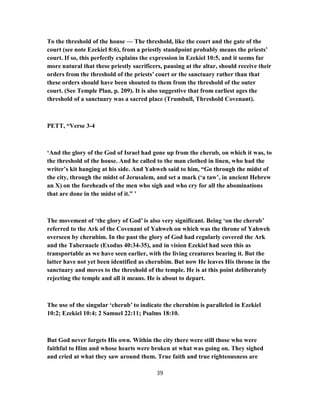



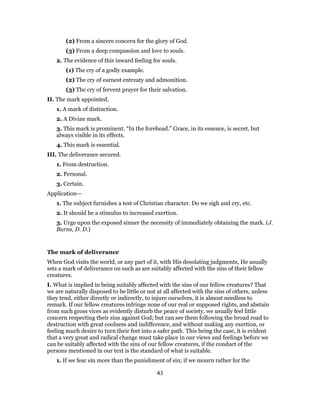



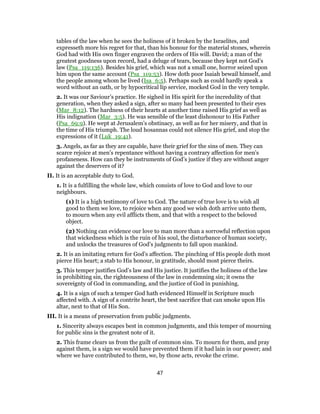

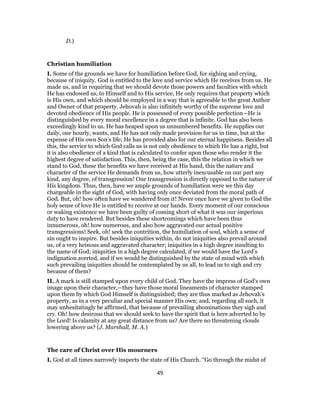









![12:22;
of the men that sigh and that cry for all the abominations that be done in the
midst thereof; the abominations were those abominable idolatries mentioned in the
preceding chapter, and those dreadful immoralities hinted at in Eze_9:9; all which were
grieving and distressing to godly minds, because they were contrary to the nature and
will of God; transgressions, of his righteous law; and on account of which his name was
dishonoured, and his ways blasphemed and evil spoken of; for these they sighed and
groaned in private, and mourned and lamented in public; bearing their testimony
against them with bitter expressions of grief and sorrow, by groans, words, and tears;
and such as these are taken notice of by the Lord; he comforts those that mourn in Zion,
and preserves them.
JAMISON, "midst of ... city ... midst of Jerusalem — This twofold designation
marks more emphatically the scene of the divine judgments.
a mark — literally, the Hebrew letter Tau, the last in the alphabet, used as a mark
(“my sign,” Job_31:35, Margin); literally, Tau; originally written in the form of a cross,
which Tertullian explains as referring to the badge and only means of salvation, the cross
of Christ. But nowhere in Scripture are the words which are now employed as names of
letters used to denote the letters themselves or their figures [Vitringa]. The noun here is
cognate to the verb, “mark a mark.” So in Rev_7:3 no particular mark is specified. We
seal what we wish to guard securely. When all things else on earth are confounded, God
will secure His people from the common ruin. God gives the first charge as to their
safety before He orders the punishment of the rest (Psa_31:20; Isa_26:20, Isa_26:21).
So in the case of Lot and Sodom (Gen_19:22); also the Egyptian first-born were not slain
till Israel had time to sprinkle the blood-mark, ensuring their safety (compare Rev_7:3;
Amo_9:9). So the early Christians had Pella provided as a refuge for them, before the
destruction of Jerusalem.
upon the foreheads — the most conspicuous part of the person, to imply how their
safety would be manifested to all (compare Jer_15:11; Jer_39:11-18). It was customary
thus to mark worshippers (Rev_13:16; Rev_14:1, Rev_14:9) and servants. So the Church
of England marks the forehead with the sign of the cross in baptizing. At the exodus the
mark was on the houses, for then it was families; here, it is on the foreheads, for it is
individuals whose safety is guaranteed.
sigh and ... cry — similarly sounding verbs in Hebrew, as in English Version,
expressing the prolonged sound of their grief. “Sigh” implies their inward grief
(“groanings which cannot be uttered,” Rom_8:26); “cry,” the outward expression of it.
So Lot (2Pe_2:7, 2Pe_2:8). Tenderness should characterize the man of God, not harsh
sternness in opposing the ungodly (Psa_119:53, Psa_119:136; Jer_13:17; 2Co_12:21); at
the same time zeal for the honor of God (Psa_69:9, Psa_69:10; 1Jo_5:19).
K&D 4-7, “The Divine Command
Eze_9:4. And Jehovah said to him, Go through the midst of the city, through the
midst of Jerusalem, and mark a cross upon the foreheads of the men who sigh and
groan over all the abominations which take place in their midst. Eze_9:5. And to those
59](https://image.slidesharecdn.com/ezekiel9commentary-161230143555/85/Ezekiel-9-commentary-59-320.jpg)


![TRAPP, “Ezekiel 9:4 And the LORD said unto him, Go through the midst of the
city, through the midst of Jerusalem, and set a mark upon the foreheads of the men
that sigh and that cry for all the abominations that be done in the midst thereof.
Ver. 4. And the Lord.] That great Imperator, General.
Go through the midst.] Discriminate; make a difference; "take out the precious
from the vile." God will sever his saints from others in common calamities, and
deliver them, if not from the common destruction, yet from the common distraction.
And set a mark upon the foreheads.] Vulgate, Et signa Thau. Whatever this mark
was, it was signum salutare. The letter Tau some think it was, as part of the word
Tichieh - i.e., Thou shalt live; according to that, "The just shall live by his faith." Or
as part of the word Torah - i.e., The law, to show that these had the law of God
written in their hearts, and this made them mourn to see it so little set by.
Howsoever, it is not the sign of the cross, as Papists would have it, but rather the
blood of the cross, wherewith, when believers are sprinkled from an evil conscience,
as the houses of the Israelites in Goshen were with the blood of the paschal lamb,
they are sure of safety here and salvation hereafter. The election of God is sure, and
hath this seal, "The Lord knoweth who are his," [2 Timothy 2:19] and it shall
appear by them. [Psalms 91:1-16] Tau is the basis of the Hebrew alphabet, saith one,
and marking by Christ is the basis of all true comfort and sound profession. Tau
endeth and closeth up the alphabet, saith another; so he who persevereth to the end
shall be saved. The mark here mentioned was not corporal but spiritual, even the
merit and spirit of Christ, the value and virtue of his death and sufferings.
Of the men that sigh and cry.] That sigh deeply and cry out bitterly for their own
and other men’s sins and miseries, and this out of piety and pity. These are not
many, yet some such are found in all ages. [Revelation 11:3] Inter vepres rosa
nascitur, et inter feras nonnullae mitescunt. (a) Let us mourn in time of sinning: so
shall we be marked in times of punishing.
62](https://image.slidesharecdn.com/ezekiel9commentary-161230143555/85/Ezekiel-9-commentary-62-320.jpg)
![SIMEON, "DUTY AND BENEFIT OF MOURNING FOR SIN
Ezekiel 9:4. And the Lord said unto him, Go through the midst of the city, through
the midst of Jerusalem, and set a mark upon the foreheads of the men that sigh and
that cry for all the abominations that be done in the midst thereof.
THERE is in the minds of ungodly men an atheistical idea, that God “does not
regard” the actions of men; and that, as to any interference in their concerns, “he
has forsaken the earth.” This was a common sentiment among the Jews [Note:
Ezekiel 8:12; Ezekiel 9:9.]; and it practically obtains to a vast extent amongst us. To
imagine that God notices such trifling matters as those which occupy our minds, is
supposed to derogate from his honour. But God is omnipresent and omniscient; the
minutest as well as the greatest things are all equally present to his all-seeing eye;
and every thing is noticed by him with an especial view to a future day of
retribution. This is particularly stated in the whole of the preceding chapter. The
elders of Israel who were at Jerusalem were given to idolatry; but they were
extremely anxious to conceal their practices from the eyes of men: hence they
performed their idolatrous rites in some secret chambers of the temple, which they
had enclosed with a wall in order to a more effectual concealment. But God in a
vision pointed out to his prophet, who was at Babylon, every thing that was
transacted in the temple at Jerusalem: and, after having given him many successive
and more enlarged views of the abominations that were committed there, issued an
order to the angels who had charge over the city, “to go forth and slay” the
offenders; but strictly prohibited them from coming near to any person to whom
these abominations had been a source of grief, and who had, in consequence of that,
been “marked in the forehead” by a person expressly commissioned for that
purpose [Note: Read the whole preceding chapter, as connected with the text.].
Though the whole of this was a vision, it was, in fact, a just representation of the
distinction which God would make between the persons who were guilty of idolatry,
and those who lamented its prevalence among them: and it may serve to shew us, in
a very instructive way,
I. The character of the Lord’s people—
63](https://image.slidesharecdn.com/ezekiel9commentary-161230143555/85/Ezekiel-9-commentary-63-320.jpg)
![Sin is “that abominable thing which God hates:” and, as it prevailed to an awful
extent at that day, so abominations of every kind yet prevail—
[They prevail in the world at large. We speak not now of the evils that are visible to
all, but of those which are of a more hidden nature. In every order of society there
are peculiar and appropriate evils, justified perhaps by those who commit them, yea
possibly dignified with the name of virtues, which yet are an utter “abomination in
the sight of God.” Were all the intrigues of the ambitious, the wantonness of the
licentious, the deceits of the covetous, the characteristic arts of every class of sinners,
exposed to view, what a mass of iniquity should we behold! Yet God beholds it all; a
mass which infinitely exceeds our highest conceptions, and which none but God
himself could endure to behold.
They prevail also, we regret to say it, even in the Church of God. It was amongst
those who professed the worship of the true God, that all those abominations were
practised in the Temple at Jerusalem: and we know that many lamentable evils were
found in the Churches that were planted by the Apostles themselves. Can we
wonder, then, if at this time tares be growing up with the wheat? It were vain to
deny that there are many who dishonour their holy profession, and give sad
occasion to the enemies of religion to blaspheme that name whereby we are named.
The pride, intolerance, and overbearing conceit of Diotrephes may yet be found,
amidst high professions of superior zeal and sanctity. Who has ever looked into the
interior of religious societies, and not seen the same undue preference to some
preachers, and contempt of others, as disgraced the Corinthian Church in the days
of Paul? Who has not discovered many a Demas, who “loves this present world,”
and foregoes his spiritual advantages with a view to increase his gains [Note: 2
Timothy 4:10.]? It would be well if even the base crimes of falsehood, and
overreaching, and dishonesty were not sometimes found in the skirts of those who
would be thought to have kept their garments clean; yea, if intemperance also and
uncleanness did not give the lie to their profession. But the more we inspect the
sanctuary of God, the more we shall see occasion for humiliation and grief on
account of many, who “have a name to live, but are dead;” and who, through their
misconduct, “cause the way of truth to be evil spoken of.” And such may well expect
that “judgment shall begin with them [Note: Compare ver. 6. with 1 Peter 4:17.].”
We need scarcely add, that evils prevail also in the heart even of true believers. Paul
64](https://image.slidesharecdn.com/ezekiel9commentary-161230143555/85/Ezekiel-9-commentary-64-320.jpg)
![himself confessed, that there was “a law in his members warring against the law of
his mind, and sometimes bringing him into captivity to the law of sin in his
members:” and the more conversant we are with our own hearts, the more we shall
bewail our innumerable short-comings and defects. Our impatience, our distrust of
God, our unbelief, our obduracy, our sloth, our coldness in duties, our sad mixture
of principle even in our better actions; our want of love to the Saviour, our want of
compassion for our fellow-creatures, our want of zeal for God; alas! alas! our want
of every thing that is good, may well make the very best of us “sigh and cry,” and,
like Paul, to account ourselves “less than the least of all saints,” or rather as “the
chief of sinners.”]
To bewail these abominations is characteristic of every child of God—
[Hear how Moses lamented them in his day [Note: Deuteronomy 9:18-19.]: how
David also [Note: Psalms 119:53; Psalms 119:136.], and Ezra, bewailed them [Note:
Ezra 9:3; Ezra 9:5.]: what extreme heaviness the Apostle Paul felt in his soul on this
account [Note: Romans 9:1-2.]; and especially in relation to those very evils which
we have specified as obtaining amongst the professing people of God [Note:
Philippians 3:18-19.]! And where is the saint in all the Bible who did not “groan
within himself” on account of the burthen of his own in-dwelling corruptions [Note:
Romans 8:23.]? The more any person knows of God and of his own soul, the more
disposed he is to say with Job, “Behold, I am vile [Note: Job 40:4.]!”
Before we proceed to the second point for our consideration, let us examine
ourselves, whether these things are a burthen to us, yea, our chief burthen [Note:
Zephaniah 3:18. Jeremiah 13:17. Romans 7:24.]? — — — We have no pretensions
to true religion, any farther than we answer to this character of mourners on
account of sin — — —]
From marking thus minutely the character of the Lord’s people, we proceed to
notice,
II. Their privilege—
65](https://image.slidesharecdn.com/ezekiel9commentary-161230143555/85/Ezekiel-9-commentary-65-320.jpg)
![God sets a mark on every one of his people, a mark on their foreheads, whereby
they are infallibly known to him, and shall assuredly be screened from the
destroying angels. They shall be protected,
1. Here—
[The deliverance of Noah from the Deluge, and of Lot from Sodom, shews not only
what deliverances God can vouchsafe to his chosen people, but what may be
expected by all who mourn over, and labour to counteract, the abominations that
are around them [Note: 2 Peter 2:5-9.]. In Babylon, God interposed to effect a literal
accomplishment of this prophetic vision; obtaining liberty for Jeremiah, and others
of his believing people, whilst the unbelieving part were visited with the heaviest
calamities [Note: Jeremiah 15:11; Jeremiah 39:11-12.]. And at the final destruction
of Jerusalem by the Romans, the disciples of Christ were rescued, as it were by
miracle, from all the horrors of the siege, whilst their unhappy and devoted
brethren were left to experience such troubles as never came upon any other nation
under heaven.
But, if God do not see fit to exempt his people from the calamities that fall on others,
he will so support them under their trials, and so sanctify to them their afflictions,
that they shall be constrained to say, “It was good for them to have been afflicted.”
He will enable them to “glory in tribulations,” and to “take pleasure in distresses,”
as fruits of his paternal love, and as means of furthering in their souls the purposes
of his grace.]
2. Hereafter—
[The seal which God has set in their foreheads will distinguish them from all others,
as clearly as sheep are distinguished from goats. Nor will there be any danger of
mistake in any instance whatever. In Egypt the destroying angel did not smite one
house whereon the blood of the Paschal lamb was sprinkled; nor will the judgments
of God fall on one individual, who has laid to heart the abominations of Israel. “God
66](https://image.slidesharecdn.com/ezekiel9commentary-161230143555/85/Ezekiel-9-commentary-66-320.jpg)
![has set them apart for himself;” and for him they shall be preserved. No evil shall be
“come near to him who has the mark in his forehead.” Whilst “fire and brimstone
are rained” down upon all others without distinction, these will be safely lodged in
God’s holy mountain, beyond the reach or possibility of harm.]
Address—
1. To those who think lightly of sin—
[By many it is thought a mark of weakness to sigh and cry for the sins of others, or
even for our own [Note: See their character drawn: Amos 6:1; Amos 6:3; Amos
6:5-6.]. But let those who have such light thoughts of sin, consider what sin has
done, in this world, and especially in the world to come. What innumerable evils
have existed, and do yet exist, throughout the world! yet is there not one in the
whole creation, which is not the fruit of sin. And if we could obtain one sight of
those dreary mansions, where fallen angels, together with all who have perished in
their sins, abide; or could hear but one groan of a damned soul; we should no more
account sin a light matter: no indeed, it is “fools only, who make a mock at sin.” If
this do not suffice, let such an one consider, what has been done to expiate sin. Go,
sinner, to Gethsemane, go to Calvary, and contemplate the agonies and death of
your incarnate God; and then say, Whether sin be not a tremendous evil, for which
no sighs or tears can ever be sufficient? But, without extending our thoughts to
subjects so much beyond our reach, let us only observe what have been the feelings
of persons when once they were brought to a just sense of their sins: let us hear the
bitter lamentations of Peter, or the heart-rending cries of the converts on the day of
Pentecost; and we shall no longer doubt what ought to be our views of sin, by
whomsoever it may have been committed, whether by ourselves or others. Sure we
are, that in the last day there will be no diversity of sentiment respecting this: the
glorified saints, and the condemned sinners, will have but one view of this matter, O
that now, even now, the judgment of every one amongst us might be rectified; and
that, before another day, God might see reason to set his mark upon us, as
“mourners in Zion!”]
2. To those who answer to the character described in our text—
67](https://image.slidesharecdn.com/ezekiel9commentary-161230143555/85/Ezekiel-9-commentary-67-320.jpg)
![[Persons who sigh and cry on account of sin, are apt to yield too much to desponding
fears. But they have in reality abundant cause for joy and gratitude: for if, on the
one hand, they be greatly burthened on account of sin, they have, on the other hand,
reason to rejoice that sin is their burthen. Instead of being in so deplorable a state as
they imagine, they are in a state most pleasing to God, and most profitable to
themselves. So pleased is God with those “who are poor and of a contrite spirit,”
that his eyes are fixed upon them with the utmost complacency and delight [Note:
Isaiah 66:2.]: and the Lord Jesus, the Judge of quick and dead, repeatedly declares
them blessed [Note: Matthew 5:3-4.]. Let not any one therefore be dejected because
of the depths of depravity which he sees within him; but let him rather conclude,
that God has discovered to him these hidden abominations; and let him beg of God
to give him a clearer and fuller insight into them; that so his humiliation may he
more deep, his faith more simple, his gratitude more lively, and his devotedness to
God more entire. Nor let any one be afraid of seeing thus the corruptions of his
heart: for, if only our self-knowledge drive us to Christ, and endear him to our
souls, it will prove a source of every virtue; of contrition, of fear, of dependence on
Christ, of love to his name, and of zeal for his glory. A sense of our necessities will
make us cry unto him for the gift of his Spirit; and by that Spirit we shall be “sealed
unto the day of redemption,” and “rendered meet for our heavenly inheritance.”
COKE, “Ezekiel 9:4. Set a mark— This expression alludes to the ancient custom of
marking servants in the forehead, to distinguish what they were, and to whom they
belonged. See Bishop Newton on Revelation 7:3. The reader is to remember, that all
this passed in vision, and only means that God made a distinction, and separated the
good from the bad, as really as if he had marked them with some visible sign. This
parabolic command, says Bishop Warburton, alludes to the sanction of the Mosaic
law; and implies, that virtuous individuals should be distinguished from the wicked
in a general calamity.
POOLE, “ The Lord said, spake from the midst of that glory, Ezekiel 9:3.
Unto him, the man clothed in linen, i.e. to Christ.
68](https://image.slidesharecdn.com/ezekiel9commentary-161230143555/85/Ezekiel-9-commentary-68-320.jpg)



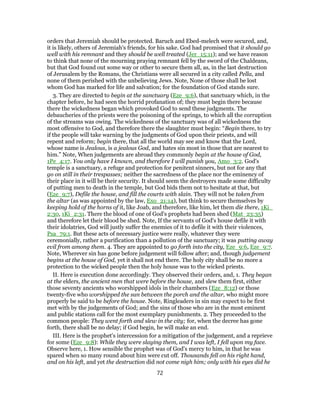
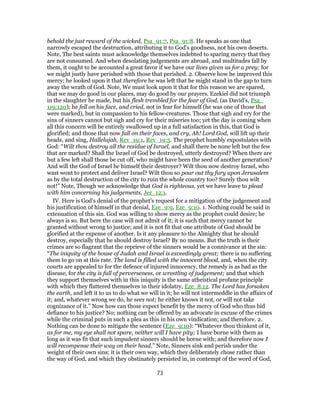
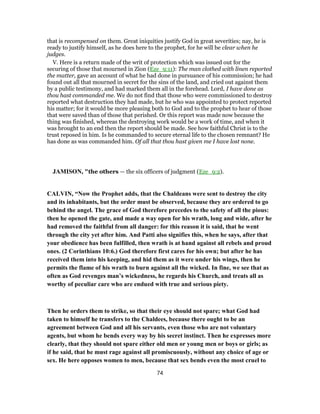
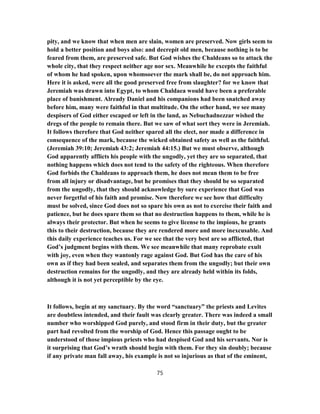
![who thus draw all men into the same ruin. For we know that the eyes of the
multitude are turned towards their superiors. Since therefore the priests sinned
more severely than all the rest, it is not surprising if God should punish them in the
first place. Those who interpret this sentence generally, as if God ordered the
Chaldeans to begin from his Church, extenuate the sense of the Prophet too much.
For this is not a comparison between the Church of God and profane nations, but
God rather compares the ministers of his temple with the people in general, and a
clearer explanation follows directly after, that the Chaldeans began from the men,
the elders who were before the house; that is, who were set over the temple Now it
follows —
ELLICOTT, “(5) Go ye after him.—No interval is allowed. Here, as in the
corresponding visions in Revelation referred to above, judgment waits only until
those whom mercy will spare have been protected. (Comp. the deliverance of Lot,
Genesis 19:22-25.) The destruction was to be utter and complete, and was to begin at
the sanctuary, where the gross sin of the people had culminated. This is one of those
many important passages in Scripture (comp. Matthew 25:41; Luke 23:30;
Revelation 6:16, &c.) in which God reveals Himself as one who will ultimately take
vengeance without pity upon those who have rejected and insulted His mercy and
long-suffering kindness. The revelation of future wrath is no less clear and distinct
than that of love to those who trust in Him.
TRAPP, “Ezekiel 9:5 And to the others he said in mine hearing, Go ye after him
through the city, and smite: let not your eye spare, neither have ye pity:
Ver. 5. Go ye after him.] Go not till he hath marked the mourners, so chary and
choice is God of his jewels. Mercy is his firstborn, saith one, and visits the saints ere
judgments break out. [Isaiah 26:20-21]
Verse 6
Ezekiel 9:6 Slay utterly old [and] young, both maids, and little children, and
women: but come not near any man upon whom [is] the mark; and begin at my
sanctuary. Then they began at the ancient men which [were] before the house.
76](https://image.slidesharecdn.com/ezekiel9commentary-161230143555/85/Ezekiel-9-commentary-76-320.jpg)
![Ver. 6. Slay utterly old and young.] (a) A dreadful commission; see it fully executed,
2 Chronicles 36:17 : all sorts, sexes, and sizes of people were corrupted; and since
there was no hope of curing, there must be cutting.
But come not near any upon whom is the mark.] These were the "precious sons of
Zion," the "excellent ones of the earth" - as whatsoever is sealed is excellent in its
kind, [Isaiah 28:25] hordeum signatum. - these are the darlings, the favourites;
handle them gently therefore for my sake, touch not mine anointed, come not near
any such to fright them, but keep your distance.
And begin at my sanctuary.] From whence went forth profaneness into the whole
land. [Jeremiah 23:15] These sanctuary men were an ill generation; at them
therefore begins the judgment. God will be sanctified in all that draw near unto
him. Nadab and Abihu found the flames of jealousy hottest about the altar. Uzzah
and the Bethshemites felt that justice as well as mercy is most active about the ark.
Murderers must be drawn from the altar to the slaughter. [Exodus 21:14] Holy
places were wont to be refuges; not so here, but the contrary.
Then they began at the ancient men.] At those seventy seniors, [Ezekiel 8:11] whose
foul offences had flown far upon the two wings of evil example and scandal.
POOLE, “ The others; the six slaughtermen.
He said; the God of glory, or Christ, who appeared in great glory.
In my hearing; a note of certainty of the thing.
Go ye after him; linger not ere you set forward against the wicked, yet still go after,
77](https://image.slidesharecdn.com/ezekiel9commentary-161230143555/85/Ezekiel-9-commentary-77-320.jpg)


![and women,.... All, of them objects of compassion, because of their age and sex; and
yet none to be spared; and which orders were exactly obeyed; see 2Ch_36:17;
but come not near any man on whom is the mark; these were not to be slain; and
though some were carried captive, as Daniel, and others; yet it was for their good and
God's glory; see Rev_7:3;
and begin at my sanctuary; the temple, the house of God, and the priests and Levites
that dwelt there. The Septuagint version is, "begin at my saints"; those who professed
themselves to be the saints of the Lord, and were separated and devoted to his service;
and so the Rabbins say (y), do not read ,ממקדשי "at my sanctuary"; but ,ממקודשי "at
those that sanctify me", or "my sanctified ones"; which they interpret of those that keep
the whole law, from "aleph" to "tau"; see 1Pe_4:17;
then they began at the ancient men which were before the house; the seventy
elders of Israel, who offered incense to the idols portrayed upon the walls of the
chambers of the temple, Eze_8:10; these they slew first.
JAMISON, "come not near any ... upon whom ... mark — (Rev_9:4). It may be
objected that Daniel, Jeremiah, and others were carried away, whereas many of the vilest
were left in the land. But God does not promise believers exemption from all suffering,
but only from what will prove really and lastingly hurtful to them. His sparing the
ungodly turns to their destruction and leaves them without excuse [Calvin]. However,
the prophecy waits a fuller and final fulfillment, for Rev_7:3-8, in ages long after
Babylon, foretells, as still future, the same sealing of a remnant (one hundred forty-four
thousand) of Israel previous to the final outpouring of wrath on the rest of the nation;
the correspondence is exact; the same pouring of fire from the altar follows the marking
of the remnant in both (compare Rev_8:5, with Eze_10:2). So Zec_13:9; Zec_14:2,
distinguish the remnant from the rest of Israel.
begin at ... sanctuary — For in it the greatest abominations had been committed; it
had lost the reality of consecration by the blood of victims sacrificed to idols; it must,
therefore, lose its semblance by the dead bodies of the slain idolaters (Eze_9:7). God’s
heaviest wrath falls on those who have sinned against the highest privileges; these are
made to feel it first (1Pe_4:17, 1Pe_4:18). He hates sin most in those nearest to Him; for
example, the priests, etc.
ancient men — the seventy elders.
WHEDON, “ 6. Begin at my sanctuary — Or, consecrated ones (LXX.). It is fitting
that the heaviest and speediest judgment fall upon those who have had greatest
privileges, and thus have sinned against greatest light (Amos 1:2; 1 Peter 4:17;
Matthew 11:21). “Dante and Michael Angelo locate bishops in hell. The cardinal’s
hat appears in Fra Angelico’s picture of the prison of lost souls. We shall not escape
the punishment of our sins by putting on clerical vestments.” — Adeney.
80](https://image.slidesharecdn.com/ezekiel9commentary-161230143555/85/Ezekiel-9-commentary-80-320.jpg)
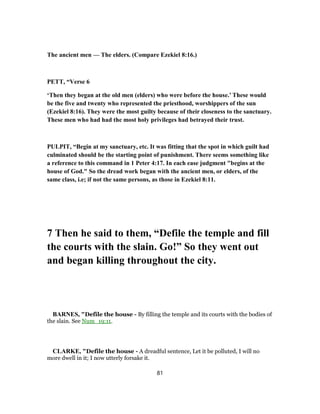

![God: then that they had returned from the slaughter, to prove their obedience to
God. In fine, he shows that God’s threatenings should not be in vain, because as
soon as the right time should arrive, the army of the Chaldeans would be prepared
for obedience. It follows —
COKE, “Ezekiel 9:7. Defile the house— God hereby declares that he will no longer
own the temple for the place of his residence, as having been polluted with idolatry;
and therefore he delivers up both the inner and outer court to be polluted with
blood. See chap. Ezekiel 10:3; Ezekiel 10:5.
ELLICOTT, “(7) Defile the house.—The utmost possible pollution under the Mosaic
economy was the touch of a dead body. (See Numbers 19:11; 1 Kings 13:2; 2 Kings
23:16.) It might be thought that the Temple would be spared this defilement; but not
only must the execution of justice override all technicalities, as at the execution of
Joab (1 Kings 2:28-31), but in this case the very defilement itself was a part of the
judgment, since God was about to forsake His sanctuary, and give over even this to
the desolations of the heathen. From the Temple the destroying angels passed out
into the city.
TRAPP, “Ezekiel 9:7 And he said unto them, Defile the house, and fill the courts
with the slain: go ye forth. And they went forth, and slew in the city.
Ver. 7. Defile the house.] Once hallowed by myself, but now abhorred and rejected
as a stew or sty of filthiness.
Fill the courts.] That where they have sinned, there they may suffer, as did Ahab. [1
Kings 22:38 2 Kings 9:26]
POOLE, “ Defile the house; regard not the holiness of the temple: idolaters, whom
you are to slay, have defiled it with the blood of idols, sacrifices, do you defile it with
the blood of the idolatrous sacrificers; slay them where you find them, for there they
83](https://image.slidesharecdn.com/ezekiel9commentary-161230143555/85/Ezekiel-9-commentary-83-320.jpg)

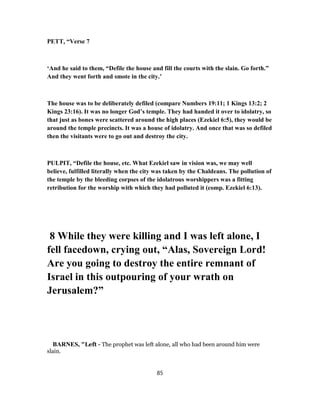
![CLARKE, "Wilt thou destroy all the residue of Israel, On thy pouring out
of thy fury upon Jerusalem? - These destroyers had slain the seventy elders, the
twenty-five adorers of the sun, and the women that mourned for Tammuz; and on seeing
this slaughter the prophet fell on his face, and began to make intercession.
GILL, "And it came to pass, while they were slaying them,.... That were in the
city:
and I was left; in the temple; and the only one that was left there, the rest were slain;
for there were none marked in the temple, only in the city, Eze_9:4;
that I fell upon my face; as a supplicant, with great humility:
and cried, and said; being greatly distressed with this awful providence:
ah, Lord God! wilt thou destroy all the residue of Israel; the ten tribes had been
carried captive before; there only remained the two tribes of Judah and Benjamin, and
these were now threatened with an utter destruction:
in thy pouring out of thy fury upon Jerusalem? shown in the destruction of men,
both in the city and temple, by famine, pestilence, and sword.
JAMISON, "I was left — literally, “there was left I.” So universal seemed the
slaughter that Ezekiel thought himself the only one left [Calvin]. He was the only one left
of the priests “in the sanctuary.”
fell upon my face — to intercede for his countrymen (so Num_16:22).
all the residue — a plea drawn from God’s covenant promise to save the elect
remnant.
K&D 8-11, “Intercession of the Prophet, and the Answer of the Lord
Eze_9:8. And it came to pass when they smote and I remained, I fell upon my face,
and carried, and said: Alas! Lord Jehovah, wilt Thou destroy all the remnant of Israel,
by pouring out Thy wrath upon Jerusalem? Eze_9:9. And He said to me: The iniquity
of the house of Israel and Judah is immeasurably great, and the land is full of blood-
guiltiness, and the city full of perversion; for they say Jehovah hath forsaken the land,
and Jehovah seeth not. Eze_9:10. So also shall my eye not look with pity, and I will not
spare; I will give their way upon their head. Eze_9:11. And, behold, the man clothed in
white linen, who had the writing materials on his hip, brought answer, and said: I
have done as thou hast commanded me. - The Chetib נאשׁאר is an incongruous form,
composed of participle and imperfect fused into one, and is evidently a copyist's error. It
is not to be altered into ר ֵאָשּׁ ֶ,א however (the 1st pers. imperf. Niph.), but to be read as a
86](https://image.slidesharecdn.com/ezekiel9commentary-161230143555/85/Ezekiel-9-commentary-86-320.jpg)
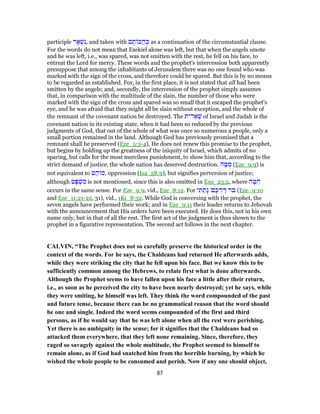

![wished to be worshipped in that one place. Since, therefore, the Prophet saw that
city destroyed, he broke forth into a cry, what then will become of it! For when thou
hast poured forth thine anger against Jerusalem, nothing will remain left in the city.
Hence also it will readily be understood, that God’s covenant was almost
obliterated, and had lost all its effect. Now it follows —
COFFMAN, “Verse 8
"And it came to pass while they were smiting, and I was left, that I fell upon my
face, and cried, and said, Ah Lord Jehovah, wilt thou destroy all the residue of
Israel in thy pouring out of thy wrath upon Jerusalem? Then said he unto me, The
iniquity of the house of Israel and Judah is exceeding great, and the land is full of
blood, and the city full of wresting of judgment: for they say, Jehovah hath forsaken
the land, and Jehovah seeth not. And as for me also, mine eye shall not spare,
neither will I have pity, but I will bring their ways upon their head. And, behold, the
man clothed in linen, who had the inkhorn by his side, reported the matter saying, I
have done as thou hast commanded me."
EZEKIEL'S INTERCESSION OF NO AVAIL
"This passage shows how wrong are those evaluations of Ezekiel that see him only
as a merciless religious zealot. The prophets of God had a heart for the people to
whom they had to preach condemnation and judgment."[15] Ezekiel loved his
people and their sacred city Jerusalem; and it is possible that he still might have
been thinking that the "righteous remnant" so often mentioned by Isaiah, and
which also vividly appears now and then in his own writings, would undoubtedly be
found "in Jerusalem."
However, the events which Ezekiel saw in this vision appeared to the prophet as the
end of any such possibility as that of a "righteous remnant" remaining in
Jerusalem. No! The "righteous remnant" would be found among the captives in
Babylon, not in Jerusalem; and the complete end of Jerusalem, as it began to unfold
before the eyes of Ezekiel, broke his heart, because he probably thought there might
89](https://image.slidesharecdn.com/ezekiel9commentary-161230143555/85/Ezekiel-9-commentary-89-320.jpg)
![not be left any remnant at all; and that appears to be the reason for his passionate,
tearful and heartbroken intercession.
"I fell upon my face, and cried, and said, Ah Lord, wilt thou destroy all the residue
of Israel ..." (Ezekiel 9:8)? The background of this plea is most certainly that of
Ezekiel's knowledge of God's promise that a "righteous remnant" would remain,
There is a similarity here to Abraham's intercession for Sodom and Gomorrah.
Both intercessions were offered in the form of a question. Both were based upon
previous promises of God. Here, the promise was that God would spare a remnant.
With Abraham, the promise that God would destroy Sodom and Gomorrah. Here
the tearful question is "Wilt thou destroy the residue of Israel?" With Abraham, the
question was, "Wilt thou destroy the righteous with the wicked?" There is also a
third similarity, namely, in the fact that both intercessions failed. Both Jerusalem
and Sodom were destroyed, exactly as God promised. God did not violate his
promise in either case. There were not ten righteous persons in Sodom; and God
preserved a "righteous remnant," as he promised, only it was not in Jerusalem, but
in Babylon!
"The iniquity of the house of Israel and Judah is exceeding great ..." (Ezekiel 9:9).
God here gave the grounds for the utter necessity of Jerusalem's destruction. At
first, we are surprised that God did not here enumerate such things as Israel's
worshipping other gods, or their defiling the temple, or of their neglect of sacrifices,
despite the fact of such sins being the source of all their wickedness. The wickedness
mentioned here was, (1) the land was filled with blood; (2) the city is full of injustice,
and (3) they do not believe in an omniscient, personal God to whom every man must
give an account. "These terrible conditions were the end result of the peoples' false
religion."[16]
Nothing is any more important in the life of any man or any nation than his religion.
The relationship to God is the governor and determiner of everything else. If that
relationship is correct, so will be his life; if it is wrong, no other obligation or duty
will be honored for one minute longer than the personal wishes of the sinner may
dictate.
90](https://image.slidesharecdn.com/ezekiel9commentary-161230143555/85/Ezekiel-9-commentary-90-320.jpg)
![Illustration: This writer once visited a young woman just married who was severely
prejudiced against her husband's religion; and she vowed that, "I am going to take
him away from that church."
She did so. Seven years later, she called, pleading for aid to save her marriage. He
had developed an affair with another woman; and the answer to her was, "What
did you expect? When any person forsakes his duty to God, why should he honor
any other duty?"
"Mine eye shall not spare, neither will I have pity ..." (Ezekiel 9:10). This was God's
answer to Ezekiel. Jerusalem would be subjected to the destruction which they so
richly deserved. "God would have his servants humbly acquiesce in his judgments
and trust God to do exactly what is right."[17]
Ezekiel's passionate intercession evidently caused him to forget the sparing of those
who received the mark upon their foreheads; and, to soften the dreadful news of
Jerusalem's fall, God permitted him to hear the report of the Angel of Jehovah in
Ezekiel 9:11.
Those who received that mark were the true "righteous remnant"; and they were in
no danger whatever of being forsaken.
"I have done as thou hast commanded me ..." (Ezekiel 9:11). Yes indeed, some of the
righteous remnant were in Jerusalem right up to the fall and through the dreadful
events that followed, among whom, we feel sure the great prophet Jeremiah was
numbered.
"The execution of God's command in Ezekiel 9:4 to mark the faithful was passed
over as being self-evident until this verse (v. 11), where the accomplishment of it was
reported."[18] It might have been mentioned indirectly here in order to encourage
Ezekiel and to let him know that, after all, that "righteous remnant" was still and
91](https://image.slidesharecdn.com/ezekiel9commentary-161230143555/85/Ezekiel-9-commentary-91-320.jpg)
![would continue to be intact.
ELLICOTT, “ (8) I was left.—The words imply left alone. The prophet had just
before seen the courts of the sanctuary thronged with idolaters in the full glory of
their heaven-defying sin. Now it is a city of the dead, and he is left standing alone in
the midst of the dead. He falls upon his face in consternation, and pleads that “the
residue of Israel” may not be utterly destroyed. The sternness of the Divine answer
leaves no room for hope of any mitigation of the judgment. No mention is made here
of those who were to be saved; they were so few among the mass as to have no effect
upon the general impression of the vision. Yet they are not forgotten; and to show
that they are not, the man in linen is represented in the next verse (11) as reporting
that he had executed the command given him.
TRAPP, “Ezekiel 9:8 And it came to pass, while they were slaying them, and I was
left, that I fell upon my face, and cried, and said, Ah Lord GOD! wilt thou destroy
all the residue of Israel in thy pouring out of thy fury upon Jerusalem?
Ver. 8. And I was left.] And, as I was apt to think, alone. [Romans 11:3]
I fell upon my face and cried.] This is the guise of the gracious in evil times, as may
be seen in Moses, Jeremiah, Paul, Athanasius, Ambrose, &c.
Ah, Lord God!] Adonai Jehovi (not Jehova, as elsewhere usually), so the saints have
sometimes prayed, tanquam singultientes in patheticis precibus, (a) or rather sighed
out their most earnest suits to God. {as Genesis 15:2-8 Deuteronomy 3:24;
Deuteronomy 9:26}
Wilt thou destroy all the residue of Israel?] Brevis quidem est haec querimonia
prophetae: at multa complectitur. (b) This is a brief but a complexive complaint,
and hath much in it.
92](https://image.slidesharecdn.com/ezekiel9commentary-161230143555/85/Ezekiel-9-commentary-92-320.jpg)



![perverseness — “apostasy” [Grotius]; or, “wresting aside of justice.”
Lord ... forsaken ... earth ... seeth not — The order is reversed from Eze_8:12.
There they speak of His neglect of His people in their misery; here they go farther and
deny His providence (Psa_10:11), so that they may sin fearlessly. God, in answer to
Ezekiel’s question (Eze_9:8), leaves the difficulty unsolved; He merely vindicates His
justice by showing it did not exceed their sin: He would have us humbly acquiesce in His
judgments, and wait and trust.
BI, “The iniquity of the house of Israel and Judah is exceeding great.
The evil and its remedy
(with 1Jn_1:7):—We can learn nothing of the Gospel except by feeling its truths,—no one
truth of the Gospel is ever truly known and really learned until we have tested and tried
and proved it, and its power has been exercised upon us. No man can know the greatness
of sin till he has felt it, for there is no measuring rod for sin except its condemnation in
our own conscience, when the law of God speaks to us with a terror that may be felt. And
as for the richness of the blood of Christ and its ability to wash us, of that also we can
know nothing till we have ourselves been washed, and have ourselves proved that the
blood of Jesus Christ the Son of God hath cleansed us from all sin.
1. I shall begin, then, with the first doctrine—“The iniquity of the house of Israel and
Judah is exceeding great.” Some imagine that the Gospel was devised, in some way
or other, to soften down the harshness of God towards sin. Ah! how mistaken the
idea! There is no more harsh condemnation of sin anywhere than in the Gospel. Nor
does the Gospel in any way whatever give man a hope that the claims of the law will
be in any way loosened. Christ hath not put out the furnace; He rather seemeth to
heat it seven times hotter. Before Christ came sin seemed unto me to be but little;
but when He came sin became exceeding sinful, and all its dread heinousness started
out before the light. But, says one, surely the Gospel does in some degree remove the
greatness of our sin. Does it not soften the punishment of sin? Ah, no! Stand at the
feet of Jesus when He tells you of the punishment of sin, and the effect of iniquity,
and you may tremble there far more than you would have done if Moses had been the
preacher, and if Sinai had been in the background to conclude the sermon. And now
let us endeavour to deal with hearts and consciences a moment. There are some here
who have never felt this truth. But come, let me reason with you for a moment. Your
sin is great, although you think it small. Follow me in these few thoughts, and
perhaps thou wilt better understand it. How great a thing is one sin when, according
to the Word of God, one sin could suffice to damn the soul. One sin, remember,
destroyed the whole human race. Again, what an imprudent and impertinent thing
sin is. Behold! there is one God who filleth all in all, and He is the Infinite Creator.
He makes me, and I am nothing more in His sight than an animated grain of dust;
and I, that animated grain of dust, with a mere ephemeral existence, have the
impertinence and imprudence to set up my will against His will! I dare to proclaim
war against the Infinite Majesty of heaven. Again, how great does your sin and mine
seem, if we will but think of the ingratitude which has marked it. Oh, if we set our
secret sins in the light of His mercy, if our transgressions are set side by side with His
favours, we must each of us say, our sins, indeed, are exceeding great! And again, I
repeat it, this is a doctrine that no man can rightly know and receive until he has felt
it. Hast thou ever felt this doctrine to be true—“my sin is exceeding great”?
96](https://image.slidesharecdn.com/ezekiel9commentary-161230143555/85/Ezekiel-9-commentary-96-320.jpg)

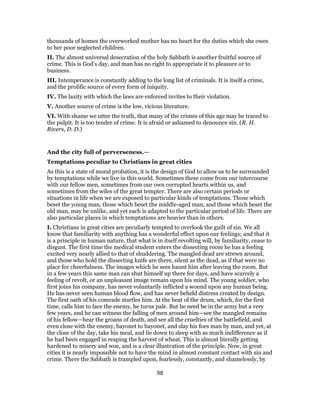

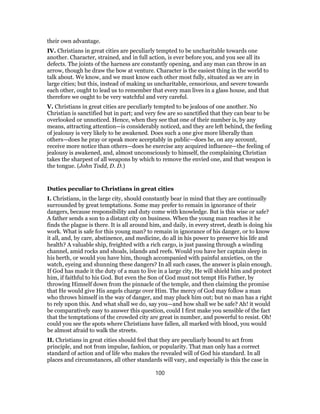


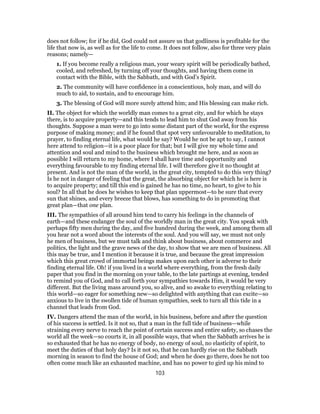



![of the house, as ready now to depart from the devoted temple, when he had given
the last directions to separate the few precious from the vile. And,
[1.] He called to the man clothed with linen, &c. God's first care is for his believing
people: they were but few, yet precious in his sight. They could not behold these
abominations practised by their countrymen without the bitterest concern and
anguish, which they terrified publicly, and lamented before God in private. On
them, therefore, God commands a distinguishing mark to be set, on the foreheads,
that they might be known to belong to God, see Revelation 7:3 in allusion to the
marks on servants, or to the blood on the lintels and side-posts of the Israelites in
Egypt, to guard them from the destroying angel. Note; (1.) God's people cannot
without the deepest concern behold a world lying in wickedness; they remonstrate
against the evil, and with tears before God and man lament over perishing souls. (2.)
They who distinguish themselves by a concern for God's glory, shall be
distinguished by his care for their safety.
[2.] To the others he said, to the six destroyers, Go ye after him, through the city,
and slay with unrelenting severity both young and old, all of every age and sex,
beginning at the sanctuary: the priests, who were chief in iniquity, must be the first
and chief sufferers; and none must be spared, but those on whom is God's mark;
these they may not touch, nor come near. No sooner is the command issued, than the
destroyers obey, beginning with those ancients, the five-and-twenty, or the seventy,
which were before mentioned, profaning God's temple with their idolatries. Nor
need they fear to defile God's house with the blood of the slain, since they have his
commission. Because these ancients have polluted it with their abominations, God
will more pollute it with their dead carcases: and when they have begun their
bloody work in the sanctuary, they must finish it in the city by a general massacre;
and it is done. Note; (1.) They who persist in their impenitence will die without
mercy. (2.) None in a judgment day will meet so terrible a doom as those who, being
appointed to admonish others, have seduced and destroyed the souls to whom they
were ordained to minister.
2nd, We have,
107](https://image.slidesharecdn.com/ezekiel9commentary-161230143555/85/Ezekiel-9-commentary-107-320.jpg)
![1. The prophet an intercessor in behalf of this miserable people. While the execution
was performing, and the prophet alone in the temple, all who were there besides
being slain, he fell upon his face in great humility, and cried and said, Ah, Lord
God, wilt thou destroy all the residue of Israel, in thy pouring out of thy fury upon
Jerusalem? he dreaded a total excision, and fain would stay the avenging arm. Note;
A gracious soul cannot unmoved behold the miseries coming on the wicked, and fain
would avert the dreadful storm by his prayers.
2. God cannot grant his request; their iniquities are such as admit of neither pardon
nor reprieve: their sins are most aggravated; their land full of blood; murders the
most inhuman, and every atrocious crime prevailing; the city is fall of perverseness;
no justice or truth is regarded; and, atheistical in principles as in practice, they
blasphemously dared to deny the government of his providence, and flattered
themselves with impunity in their iniquity: therefore God threatens with unsparing
hand to punish them, to shut up his compassions, and to refuse to be in-treated by
them or for them, bringing upon them the wrath which they had so highly provoked
and deserved. Note; Though we may never cease to cry to God, there is a time when
sinners are past the efficacy of prayer.
3. The man clothed with linen, &c. reports, that the divine orders were
accomplished; the genuine people of God marked; the wicked destroyed. Oh, that all
might learn from these awful lessons to turn to God, and walk with him in holiness
of heart and life!
TRAPP, “Ezekiel 9:9 Then said he unto me, The iniquity of the house of Israel and
Judah [is] exceeding great, and the land is full of blood, and the city full of
perverseness: for they say, The LORD hath forsaken the earth, and the LORD seeth
not.
Ver. 9. The iniquity of Israel is exceeding great.] Nimls veldt. Still there is a cause, to
be sure; and God’s judgments are sometimes secret, ever just; and as swift rivers,
when they once fall into lakes or seas, are at rest, so are our restless minds, when
once they fall into the depth of the Divine justice, duly considered.
108](https://image.slidesharecdn.com/ezekiel9commentary-161230143555/85/Ezekiel-9-commentary-108-320.jpg)
![And the city full of perverseness.] Or, Wresting of judgment. Declinatione et
detorsone iudicii. Mutteh, i.e., mishpat din Mitteh, saith the Hebrew scholiast; (a)
that is, judgment turned from the bias, as it were: when the balance of justice is
tilted on to one side, as Paul’s word, κατα προσκλισιν, importeth. [1 Timothy 5:21]
For they say, The Lord hath forsaken the earth.] See on Ezekiel 8:12. Hic est fons
omnium scelerum, saith A Lapide: hinc ruunt homines in celerum abyssam, saith
Theodoret. When men are once turned atheists, what will they not dare to do? What
should hinder them from laying the reins on the neck, and running riot in
wickedness?
POOLE, “ Then said he; God gives him a speedy answer.
Of the house of Israel; of those who either joined themselves to the house of David
when the ten tribes fell off, or those that escaped when Shalmaneser carried them
captive.
Judah; the two tribes; though only one is expressed the other is included.
Exceeding great; grown beyond all measure, that my justice cannot, and my mercy
must not, longer forbear. Full of blood; very much innocent blood is spilt, or there
are many bloodshedders among them.
Full of perverseness; all judgment is perverted; in judges, to injustice; in priests, to
idolatry; in all, to scepticism, or atheism.
They say; they argue and dispute against my concerning myself in the government
of the world and the church.
109](https://image.slidesharecdn.com/ezekiel9commentary-161230143555/85/Ezekiel-9-commentary-109-320.jpg)

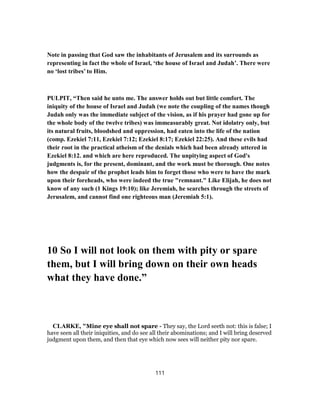
![GILL, "And as for me also,.... As they have not spared the poor and the needy, the
widow and the fatherless, but have perverted their judgment, and shed innocent blood:
mine eye shall not spare, neither will I have pity, but I will recompence their
way upon their head; deal with them by the law of retaliation, and reward them
according to their deserts; see Eze_7:4.
JAMISON, "mine eye — to show them their mistake in saying, “The Lord seeth
not.”
recompense their way upon their head — (Pro_1:31). Retribution in kind.
CALVIN, “Now God pronounces the Jews to be so obstinate in their malice as to
have cut off from themselves all hope of pardon. For when he now says, that he
would be hostile to them without pity, he shows the necessity of taking vengeance,
because their impiety had penetrated even heaven, so that he could not spare them
without denying himself. And abrupt speech increases vehemence, as if God
pronounced that he had changed his plans. Now then we understand the meaning of
this answer, that the Jews were bound by so many and such impious crimes, that
they had closed the door of God’s pity: nay, they had compelled him to the utmost
pitch of vengeance, because they continued to provoke him more and more. Let us
learn then from this passage not to weigh God’s judgments in our scale, because we
are too much accustomed to extenuate our sins, and to treat our serious iniquities as
but slight errors, because we do not attribute just honor to God as the only judge.
Now when God commands his Prophet to rest and be silent, without doubt he at the
same time restrains that rashness of ours by which we burst forth in disobedience
when he seems to us to be too rigid. But, as I have said, we do not consider the
greatness of our sins. Therefore it is God’s province alone to pronounce concerning
sins, that no mortal should estimate the quality of actions, for then we trench on
God’s peculiar office. It follows —
TRAPP, “Ezekiel 9:10 And as for me also, mine eye shall not spare, neither will I
have pity, [but] I will recompense their way upon their head.
Ver. 10. And as for me also.] Quapropter etiam ego, Wherefore also I and there is a
stop by an elegant aposiopesis. (a)
112](https://image.slidesharecdn.com/ezekiel9commentary-161230143555/85/Ezekiel-9-commentary-112-320.jpg)
![Mine eye shall not spare.] Ezekiel 5:11; Ezekiel 7:4; Ezekiel 8:18. See a just
commentary upon these words, Jeremiah 9:3-17.
POOLE, “ As for me, my resolution is fixed.
Mine eye, that eye they thought did not see to govern, shall see to punish.
I will recompense; they shall find me a Sovereign to vindicate myself, and do justice
against their injustice. See Ezekiel 5:11 7:4.
WHEDON, “10. Mine eye shall not spare — How constantly this terrible statement
is repeated (Ezekiel 5:11; Ezekiel 7:4; Ezekiel 8:18). Yet it must be remembered that
this was only a prophetic vision of calamities that would certainly come if the people
remained impenitent, but which might still be averted. Even the prophecies against
Nineveh were recalled when the people repented. All these positive declarations,
“mine eye shall not pity,” etc., are conditional upon the persistent and obstinate
impiety of the nation; are in reality intended to drive back the people from their
wickedness, and seem finally, at least in part, to have attained their merciful object.
“The surgeon has a steadier hand than the soldier. His knife is more inexorable than
the sword of war (Hebrews 12:6)” — Adeney.
PETT, “Verse 10
“And as for me also, my eye will not spare, nor will I have pity. But I will bring their
way on their head.”
So as there was no justice and mercy among the inhabitants of Jerusalem and its
surrounds, so there would be no mercy from God. He would make them reap what
they had sown, and there would be no restraint. His eye was and had been on them
all the time. And now it would demand justice. ‘All things are laid bare and open to
the eye of Him with Whom we have to do’ (Hebrews 4:13), and He will always
113](https://image.slidesharecdn.com/ezekiel9commentary-161230143555/85/Ezekiel-9-commentary-113-320.jpg)
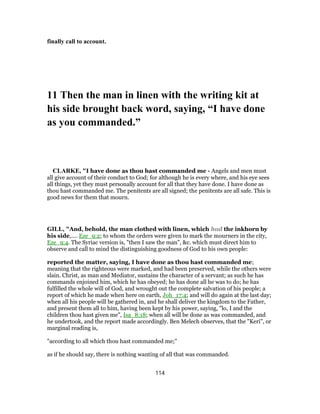
![JAMISON, "I have done as thou hast commanded — The characteristic of
Messiah (Joh_17:4). So the angels (Psa_103:21); and the apostles report their fulfillment
of their orders (Mar_6:30).
CALVIN, “This sentence confirms what I said yesterday about God’s paternal
anxiety towards the faithful. For the Prophet taught, before God would permit the
Chaldeans to destroy the city, that an angel was sent before to succor the elect, and
thus to oppose himself to the violence of the enemies: where we have said that it is
shown to us as in a glass that God holds this order in his judgments, that his fatherly
love towards the faithful always precedes them, so that he does not permit anything
to happen to them but what tends to their safety. For this reason the angel now says,
that he had done as he was commanded. Doubtless the obedience of the angel is
reported to us, because it answers to the will of God. Hence, therefore, we gather
that the safety of the faithful is always precious to God, and therefore they will
always be safe and secure when we think heaven and earth mingled together. This
then is the explanation. Now follows —
TRAPP, “Ezekiel 9:11 And, behold, the man clothed with linen, which [had] the
inkhorn by his side, reported the matter, saying, I have done as thou hast
commanded me.
Ver. 11. And behold the man reported the matter.] The Vulgate hath it respondit
verbum, as if he had been asked before whether he had done as was bidden.
I have done as thou hast commanded me.] So did David; [Psalms 119:112 Acts
13:22] and the Son of David; [John 17:4; John 14:31] and Paul, witness his famous
vox voice προαγωνιος. [2 Timothy 4:6-8] Let every of us so carry the matter toward
God that at death we may say with that servant in Luke 17:9, "Lord, it is done as
thou hast commanded."
POOLE, “ While God gave the prophet the account of the people’s sins, and of his
own resolutions, Christ,
115](https://image.slidesharecdn.com/ezekiel9commentary-161230143555/85/Ezekiel-9-commentary-115-320.jpg)
